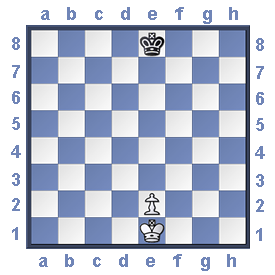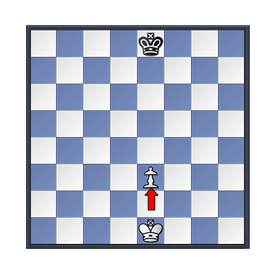Agebraic Notation is a 'Chess Code' that is easy to master. It just takes practice and it will be second nature to you.
All the squares on the Chess Board have 'addresses' composed of numbers and letters. See this section.
We now need codes for the pieces, we will then be able to write down the moves in a precise shorthand way.
We need to be sure that the code is as as possible - so it is quick to write down the move, but that it is totally . There must be .
All the pieces are given their own special letters as a shorthand version of their names, and there are symbols for the 'type of move' that has been made.
This page can serve as a reference for you, as it summarises all of the shorthand code we use for the algebraic notation.
Note that the case of the letter used in algebraic notation is important - 'B' is bishop - 'b' is a file of the chessboard).
Symbol |
Meaning |
Comment |
| K |
King |
|
| Q |
Queen |
|
| R |
Rook |
|
| B |
Bishop |
|
| N |
Knight |
or the alternative 'Kt' |
| Kt |
Knight |
or the alternative 'N' |
| P |
Pawn |
We don't use this letter for a pawn move. In fact for a pawn we don't even give details of the square it moves from. Because the movement of a pawn is so limited we can simply just give the shortened version of the square address we are moving the pawn to.
For example:
Suppose we want to move a Pawn from square e2 to square e3.

You would think that we we should write Pe2-Pe3.
But the pawn moving from square e2 to e3 just gets shortened to ' e3'.

|
| - |
moves to |
|
| x |
takes |
for example 'R x P' stands for 'Rook takes Pawn' and ' 'R x Q' stands for 'Rook takes Queen' |
| 0-0 |
Castles on the King's side |
| 0-0-0 |
Castles on the Queen's side |
| e.p. |
Pawn takes 'en passant' |
| + |
check |
|
| ++ |
double check |
|
| # |
checkmate |
|
These symbols are placed after a move to comment on its quality
|
| ! |
signifies a good move |
| !! |
signifies an outstanding move |
| ? |
signifies a bad move |
| ?? |
signifies a blunder |
| !? |
signifies an interesting move |
| ?! |
signifies a dubious move. |
|








 DISCLAIMER: The information given in this site is presented in good faith, but the site-author is human and does make mistakes! Should you find anything that you believe is in error please notify the Webmaster of your finding.
DISCLAIMER: The information given in this site is presented in good faith, but the site-author is human and does make mistakes! Should you find anything that you believe is in error please notify the Webmaster of your finding.